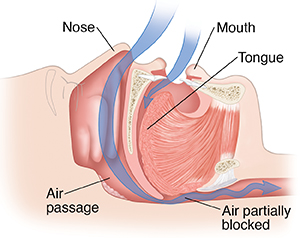Snoring is a respiratory sound generated during sleep, which is due to the vibration of the walls of the oropharynx due to a partial obstruction in this region.
What factors lead to snoring?
Snoring is a multifactorial condition. The onset of light or severe snoring is favoured by the following factors: Age, gender, heredity, body weight, alcohol consumption, taking drugs, positions at sleep, the consumption of coffee and tea, smoking, obstacles in nasal breathing, hypertrophy of the tonsils and adenoids or orthodontic problems, which consequently lead to sleeping with an open mouth.

What are the factors that can cause snoring?
The factors that can cause snoring are varied:
General causes (metabolic, particularly obesity)
Hormonal (e.g. hypothyroidism)
Age, older people snore more intensely and more frequently.
Local anatomical causes, which, if corrected, lead to the disappearance of snoring.
Does weight gain play a role in causing snoring?
An increase in body weight above normal favours the onset or aggravation of snoring. Eating and drinking alcohol before bedtime also favour the onset of snoring. Light snoring can develop into sleep apnoea syndrome.
What is sleep apnea?
It is the periodic cessation of breathing during sleep. In sleep apnoea, the airway tract becomes completely obstructed, with episodes lasting about 10 seconds.
Thorough history-taking and a complete otorhinolaryngological examination with endoscopic testing are of crucial importance. Nocturnal oximetry can be used as a screening test, to determine which patients should undergo a more specific examination, called a sleep study, during the night.
How is obstructive apnea syndrome treated?
The key parameters include weight loss and the reduction of alcohol consumption, as well as smoking cessation. However, surgery to correct the upper airway obstruction is equally important in the treatment of obstructive apnoea syndrome, either as a primary treatment in patients with mild-degree syndrome, or to maximise the efficiency of CPAP at lower pressures, in patients with severe obstructive sleep apnoea syndrome.
Are there non-invasive methods to reduce the intensity of snoring?
• If you have extra weight, follow a careful diet.
• Combine dieting with exercise. This will lead to strengthening the muscles of the respiratory tract and a reduction in the intensity of snoring. • Make sure that your bedroom has a normal temperature when you sleep and leave the window ajar.
• Prefer sleeping on your side or supine (face down) and avoid the inverted position (on your back).
• Choose pillows of moderate height. This will allow you to breathe better when you sleep.

Obviously, snoring hampers the patients’ quality of life, so its treatment is necessary. In any case, it is noted that snoring is treated taking into account the patient’s medical history, physical examination and upper airway endoscopy. Snoring can be related to both the septum and to the paranasal sinuses.
Source: pataridou.gr